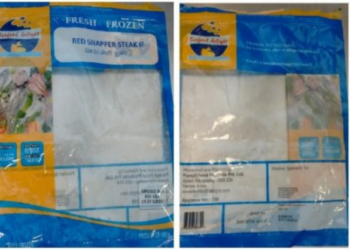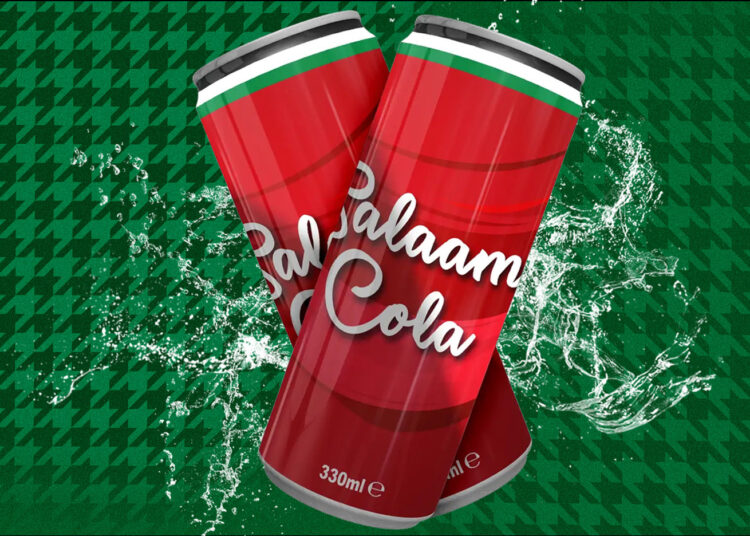Eater/Lille Allen
As activists call to boycott Coca-Cola, Salaam Cola offers an alternative. Is the solution another soda?
How do you make a better Coca-Cola? I thought of the impossibility of recreating the distinct flavor of cola as I sipped a Salaam Cola, which my local falafel shop had just begun stocking. It is a flavor I almost completely associate with the color brown, though I don’t know what creates its brownness. It’s like eating a sweet pinecone. Salaam Cola has softer bubbles than your traditional Coke. The spices are a little earthier; I think I taste sumac, but will probably never know. And the sugar, while prominent, doesn’t leave a slick of syrup down the back of my throat. Taste is subjective, but if fountain Coke everywhere were replaced with Salaam, I wouldn’t be mad.
Why do you make a better Coca-Cola? Because you want to siphon profits from the multinational corporation toward relief for Palestinians. Aykiz Shah, founder of Salaam Cola, attempted to solve a simple problem for those who want to vote with their dollars, but also love cola. She launched the brand in the U.K. (though the soda is manufactured in Turkey) in November 2023, with the mission of not only providing an alternative cola (as well as a sugar-free cola and a lemon-lime “Yemonade”), but a cola with ethics. The brand pledged that 10 percent of profits go to charities supporting Palestine, and has been posting Instagram stories of toys and food being distributed to Palestinian refugees in Egypt, presumably funded by its sales (Shah did not respond to a request for comment). “It’s more than just a new soda on the market,” Shah said in a speech in August. “It’s a call to action. It is a rallying cry for a global boycott movement that refuses to endorse brands practicing and funding genocide, operating on illegal settlements, or standing with injustice.”
While not on the list of companies to boycott from the Boycott, Divestment, Sanctions movement (a Palestinian-led movement encouraging targeted boycotts against Israeli companies), the Coca-Cola Company has faced outrage and calls for boycott as the war in Gaza galvanized protesters in late 2023. Coca-Cola has franchised with the Central Bottling Company, which operates its beverage factory out of the Atarot Settlement Industrial Zone in East Jerusalem. Atarot is an illegal Israeli settlement in the West Bank of occupied Palestine, according to international law. As settlers increasingly target the West Bank, setting fire to Palestinian towns and raiding the Al-Jazeera office as part of a blatant land grab, activists say it’s impossible to ignore Coca-Cola’s inherent endorsement of and profiting from maintaining business operations in an illegal Israeli settlement. The calls for a Coca-Cola boycott have been loud enough for the brand to respond, explicitly saying it does not send any profits directly to the Israeli army.
Suhail Kamran, owner of Pakistani street food cafe Cha in Northern Virginia, says the restaurant has always tried to support issues it cares about. From the beginning, it’s given some of its profits to the Karachi Down Syndrome organization. So finding products that also give back to organizations that support the needs of the Pakistani community, and to Muslim communities, is something he always keeps an eye out for.
When Kamran learned of the boycott against Coca-Cola last October, he immediately stopped stocking the brand, and started looking for an alternative. “We wanted to be behind this. But is there anybody else who can cover the gap when we remove Coke off the shelves?” For months, the answer seemed like no. No product tasted the same, or put its profits to any better causes. It wasn’t until he met the U.S. distributors of Salaam Cola at an entrepreneurial meetup that he felt he found the right product, one that supported the same values he did, but crucially, would be something customers would order as much as Coke.
Kamran says the distributors have also been reaching out to potential customers to drive demand, creating a word-of-mouth campaign. Souheil Ben Mansour, owner of George’s King of Falafel in Washington D.C., said he first heard of Salaam Cola from his customers, who were looking for “an option for people that don’t want to support Coca-Cola for political reasons.” He said he sold out of the drinks in the first week he stocked them and immediately had to place another order. Salaam Cola has fewer calories than Coca-Cola, likely due to its use of natural cane sugar over high-fructose corn syrup, and customers have been enjoying the taste, says the business owner. However, the main reason he began stocking it is for its political message. “Anything to help our brothers in Palestine,” he said.
Ali Sheikh, who runs the Woodbridge and Vienna locations of Korean chicken chain BB.Q Chicken, has always centered the Muslim community, which often (but not always) includes Palestinian Americans. “I was the first franchisee to go full halal in my Woodbridge location, and since then a lot of others have followed and started carrying halal chicken,” he says. However, he says he didn’t know about the boycott against Coca-Cola until he saw Salaam Cola on Instagram. Soon after, he ordered the soda for his shops, and is hoping to convince other franchise owners to do the same. “I’m not looking to profit anything extra from it,” he said. “But I am hoping to send a message to everyone that we support Salaam Cola’s goal.”
Kamran says he openly explains why he doesn’t stock Coca-Cola when customers ask about Salaam Cola. “We respectfully say this is our cause, and that we go with brands that are giving back to the community in some way,” he says. Curiosity has waned in the few weeks he’s had it in stock; most people, he says, just assume it’s an “ethnic product” and leave it at that. However, Sheikh says the drink has been popular at his BB.Q Chicken locations, with some customers asking to buy the soda by the case.
Alaa Daraghma, who distributes the soda in the U.S. with his wife, Maha, estimates they sold over 400,000 cans of soda since the launch in May, with over a million more on the way from the production facility in Turkey in September. “Though we have not yet seen profits from sales directly in our American market, combined global sales have allowed us to co-sponsor charitable efforts and projects that were carried out by our Salaam Cola partners in the U.K.,” says Daraghma. Eventually, he says, profits from American sales will go to charities like the Palestinian Children’s Relief Fund and the Zakat Foundation, which support aid for refugees from Gaza.
Salaam Cola isn’t the only company trying to make a cola that supports Palestinian causes. Cola Gaza also originates in the U.K., and also donates 10 percent of sales to “charitable projects in Palestine.” Palestine Drinks, based in Sweden but run by Palestinian parent company Safad Food, says it supports the Safad Foundation’s work in Palestine. Communications director Mohamed Kiswani tells Time that it’s sold 16 million cans since launching in March, though it’s unclear how much money toward Palestine that constitutes. “We are not selling drinks,” he says. “We are selling the brand ‘Palestine,’ to get people to talk more about the genocide that is happening.”
Does Palestine need to be a brand for that to happen? It feels bleak that a country and people being subject to such devastation would need to be attached to a product for society to take action, or that money toward refugees and aid needs to be siphoned through the middleman of soda, let alone a middleman at all. But for Maha Daraghma, the point of Salaam Cola is raising awareness of Coca-Cola’s presence in an illegal settlement. “It just brings more consciousness to consumers,” she says, which hopefully has a domino effect. Some may buy Salaam Cola because they’re boycotting Coca-Cola. Others may see the Palestinian flag colors on the can and wonder why the cola brand exists in the first place, and find themselves learning about the boycott for the first time.
Though he doesn’t stock Coca-Cola, Kamran says he tries to balance holding his values and creating a welcoming space for all customers. “Your goal as a business is not to piss off half your customers,” he says. “We’re not going to change our values, but at the same time, we want to make sure that we’re not disrespectful of people who don’t believe in the boycott movement.”
Not stocking Coca-Cola products is also a tall order for restaurants, especially since Coke owns other popular brands like Topo Chico, Gold Peak Tea, and Fanta. Sheikh notes that due to a franchise agreement, he still must stock Coca-Cola. Ben Mansour chooses to as well, saying, “We also have a lot of customers that are used to the product, and it was difficult for us to remove it from the shelves.” It’s a business, after all. But they hope customers will choose one over the other. Sheikh says he gives Salaam Cola ample space on the shelves, and “my staff has been trained on talking points about Salaam Cola, and they let the customers know the benefits of purchasing that.”
The conflation of “boycott” and “choosing something else” hits at the limits of this sort of charitable brand development, however noble the goal. A boycott is a direct, concentrated action that puts tangible pressure on a company to change its practices by way of the consumer withholding money until the company does so. It is about what you don’t buy, not what you do.
Coca-Cola attempted to mitigate backlash by audaciously claiming in a Bangladeshi ad that it supports Palestine by having a factory there, sidestepping the fact that the factory is in an illegal Israeli settlement on Palestinian land, which of course only created more outrage. As one businessperson told Al Jazeera, the “ludicrous attempt to portray that Coke has nothing to do with Israel only consolidates my stance on keep boycotting it.” But Coca-Cola still reported $45.8 billion in net revenue in 2023. Of course it did. It’s Coke. Could Salaam Cola even make a dent in Coke’s revenue?
It is, of course, great for the cola-enjoying Palestine supporter that there are drink options that do not require such cognitive dissonance, and 10 percent of sales is better than no percent of nothing. But the genocide is continuing because the people perpetuating it and profiting from it — not just the private sector, but the Israeli government, and the U.S. government providing funding for weapons — haven’t yet felt enough consequences for their actions. Not because people aren’t buying the right things. Coca-Cola can keep contracting a factory in an illegal settlement, where Palestinians are being displaced daily, because it has not yet felt that doing so is consequential to its bottom line. The point of a boycott is to create concrete, financial consequences. The average person cannot personally stop a bomb from being dropped, but they can say their money won’t go to companies that do business with the countries dropping them.
We can’t know if every can of Salaam Cola sold diverted money that would have otherwise gone to Coca-Cola, or if those dollars would have been spent on a drink that gives no profit to relief efforts. A boycott may be about what not to buy, but restaurant after restaurant choosing to place orders for Salaam Cola shows customers there is always another choice to be made. And perhaps, from there, more choices.















